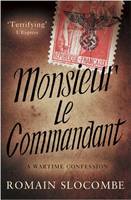 In Romain Slocombe’s Monsieur le Commandant (2011; translated from the French by Jesse Browner, 2013), it is 1942 when Paul-Jean Husson – a respected writer and member of l’Académie française – writes to his local SS officer, unable to remain silent any longer. Husson begins his story ten years earlier, when his son introduced him to his new love: a beautiful blonde German girl named Ilse Wolffsohn, whom Husson later discovered to be Jewish. Husson was immediately attracted to Ilse, an attraction that only intensified as the years went by; all the while, he remained a Nazi sympathiser, regularly publishing anti-Semitic articles. But matters would eventually come to a head; and Husson’s letter to the Commandant is the only way forward he can see.
In Romain Slocombe’s Monsieur le Commandant (2011; translated from the French by Jesse Browner, 2013), it is 1942 when Paul-Jean Husson – a respected writer and member of l’Académie française – writes to his local SS officer, unable to remain silent any longer. Husson begins his story ten years earlier, when his son introduced him to his new love: a beautiful blonde German girl named Ilse Wolffsohn, whom Husson later discovered to be Jewish. Husson was immediately attracted to Ilse, an attraction that only intensified as the years went by; all the while, he remained a Nazi sympathiser, regularly publishing anti-Semitic articles. But matters would eventually come to a head; and Husson’s letter to the Commandant is the only way forward he can see.
Monsieur le Commandant is an uncompromising book, which confronts the implacability and inherent contradictions of its protagonist’s worldview head-on: Husson is a character who has no qualms about describing graphic violence or venting his hatred, and the results of that are right there on the page. The novel becomes a grim, inexorable march towards a bitterly ironic ending; the weight of history bears down on our reading; but its starkness gives Slocombe’s book a power of its own.
***
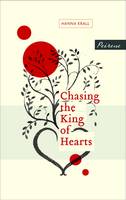
Chasing the King of Hearts by Hanna Krall (2006; translated from the Polish by Philip Boehm, 2013) is a view of 1942 from Warsaw. There are perhaps two things that matter most to Izolda: the love of her husband Shayek, and finding a way out of the Warsaw Ghetto. When Shayek is imprisoned, Izolda’s love for him leads her to do whatever she can to free him; and what she’s prepared to do seems almost without limit – she hides her identity and religion, smuggles goods into the ghetto… Even though she’s captured more than once, she refuses to give up.
In contrast with Monsieur le Commandant’s harsh precision, the tone of Krall’s book is somewhat hazier; told in a series of vignettes, the choppiness of its structure gives the text a dream-like quality, which enhances the sense of the Holocaust as something larger than those caught up in it can truly comprehend. There are moments of horror (made all the more effective by the subdued tone in which they’re written), but a deep sense of love as well. We know from several chapters within the book that Izolda survives into old age, but even then she finds herself dwelling on the past and what might have been. Chasing the King of Hearts is the story of a hard-won personal victory, and the mixed consequences it brings.
***
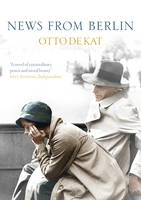 Husson and Izolda could be seen as being at two opposite ends of a continuum of experience of World War Two, a continuum that Oscar Verschuur – the protagonist of Otto de Kat’s News from Berlin (2012; translated from the Dutch by Ina Rilke, 2014) – might (at first glance, anyway) appear to be completely outside. Oscar is a Dutch diplomat in Switzerland, well away from the day-to-day realities of the war. That’s until his daughter Emma visits from Berlin, with information from her German husband Carl, a civil servant who covertly opposes the Nazi regime: an invasion of Russia is planned, codenamed Barbarossa. Now Oscar must decide whether to disclose this information, knowing that to do so may place Emma and Carl in danger.
Husson and Izolda could be seen as being at two opposite ends of a continuum of experience of World War Two, a continuum that Oscar Verschuur – the protagonist of Otto de Kat’s News from Berlin (2012; translated from the Dutch by Ina Rilke, 2014) – might (at first glance, anyway) appear to be completely outside. Oscar is a Dutch diplomat in Switzerland, well away from the day-to-day realities of the war. That’s until his daughter Emma visits from Berlin, with information from her German husband Carl, a civil servant who covertly opposes the Nazi regime: an invasion of Russia is planned, codenamed Barbarossa. Now Oscar must decide whether to disclose this information, knowing that to do so may place Emma and Carl in danger.
Relationships, it seems to me, are at the heart of News from Berlin: Oscar’s relationship with his wife Kate is pretty lukewarm and distant (literally so, as she’s currently a nurse in London). Both characters themselves drawn to someone else: he to Lara, a free-spirited Dutch woman he meets in a village hotel; she to Matteous, a wounded Congolese soldier whom she helps to treat. There’s a sense that both of Verschuurs are searching for something in these other people, not that they’re necessarily going to find it (Kate especially comes to realise how it hard it would be for Matteous to adapt to a life in London). Interestingly, Oscar’s new attraction draws him away from the reality of the war, whilst Kate’s draws her towards it; this mirrors their instinctive feelings about the Barbarossa dilemma. As a diplomat, Oscar’s work is fundamentally about relationships on a grand scale; the choice he now has to make brings that work down to the most intimate of levels. Like Slocombe and Krall in their books, de Kat explores the personal effects of war, how individual lives are shaped by conflict.
***

War’s effect on individuals is also the focus of Anna Hope’s debut, Wake (2014), which is set in the aftermath of World War One – specifically in the five days leading up to the parading of the Unknown Warrior through London in 1920. Hope tells of three women: Hettie, a dance instructress who becomes intrigued by a charismatic man she meets at the Hammersmith Palais; Evelyn, who works at the Pensions Office and has a quite a tense relationship with her army-captain brother – but still wants to know why a man comes to her office asking after him; and Ada, a housewife grieving for her son lost in the war, who receives a visit from a boy who appears to know of him.
All three of Hope’s protagonists have seen their lives changed by war: Hettie’s brother is affected by shell-shock, but the world of the dance instructress has opened a new avenue in her own life; Evelyn lost her partner in the war and now finds herself, as an unattached woman nearing 30, outside of social norms; for Ada, it’s not so much a case of needing to find a new path as of coming to terms with the one she has travelled. In Wake, the arrival of the Unknown Warrior is presented as a moment when the British people collectively took stock of the war and its consequences, a recognition of and reflection on the changing times; this is also what Hope does individually for her characters. But there is also the sense that change continues; and, indeed, the women’s stories go on beyond the final page of this vivid novel.
***
Links
Monsieur le Commandant
Interview with Romain Slocombe by Gallic Books.
Other reviews: A Life in Books; These Little Words; The Friendly Shelf; Literary Relish.
Chasing the King of Hearts
Interview with Hanna Krall by PEN Atlas.
Other reviews: Andrew Blackman; Sabotage Reviews; A Discount Ticket to Everywhere; Tony’s Reading List.
News from Berlin
Other reviews: 1streading; Lucy Popescu for the Independent.
Wake
BBC interview with Anna Hope (and Judith Allnatt, author of The Moon Field)
Other reviews: For Winter Nights; Book Oxygen; The Unlikely Bookworm; Cleopatra Loves Books.
Like this:
Like Loading...
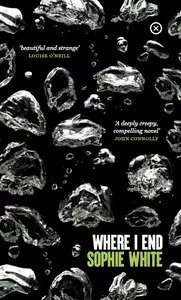
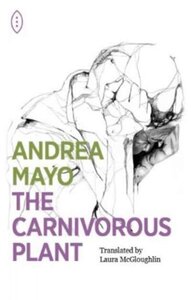
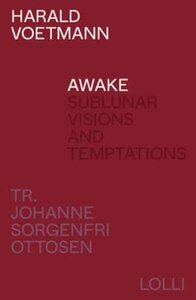
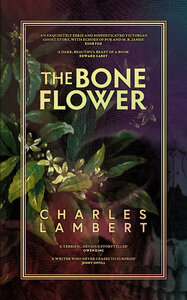
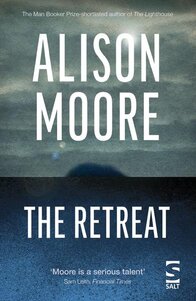

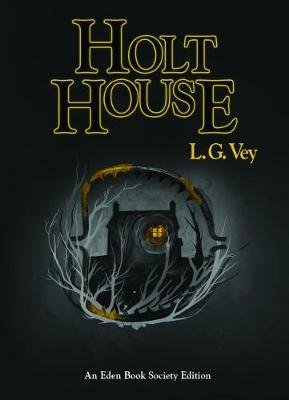




 Gabriel arrives in a small Breton town, finds a restaurant, and strikes up a friendship with the owner, José, whose wife is ill in hospital. Gabriel is a good cook and a friendly face, and presently attracts a small circle of friends, including Madeleine, the receptionist of his hotel; and Marco and Rita, a couple also staying there. But he’s also carrying baggage from his past…
Gabriel arrives in a small Breton town, finds a restaurant, and strikes up a friendship with the owner, José, whose wife is ill in hospital. Gabriel is a good cook and a friendly face, and presently attracts a small circle of friends, including Madeleine, the receptionist of his hotel; and Marco and Rita, a couple also staying there. But he’s also carrying baggage from his past… A Novel Bookstore is the ninth novel by French writer Laurence Cossé (the translaltion is by Alison Anderson); one of the launch titles for the UK imprint of
A Novel Bookstore is the ninth novel by French writer Laurence Cossé (the translaltion is by Alison Anderson); one of the launch titles for the UK imprint of  Sara Levine
Sara Levine
Recent Comments